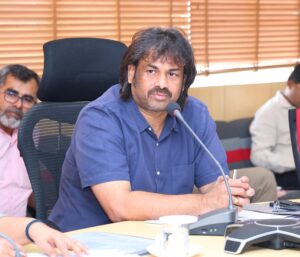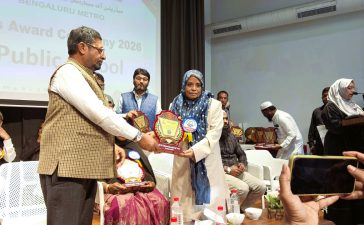Karnataka Govt Introduces Comprehensive Sex and Moral Education in Schools to Empower Adolescents
Bengaluru, March 20 – In a landmark move aimed at addressing the multifaceted challenges faced by adolescents, the Karnataka government has announced the introduction of sex education and moral education in schools. The initiative, which has been widely applauded by educationists, health professionals, and child psychologists, is seen as a progressive step toward fostering holistic development among young students.
A Progressive Step Toward Adolescent Well-Being
The government’s decision to introduce sex education for students in classes eight to twelve, alongside compulsory moral education from classes one to ten, is designed to equip young minds with scientific knowledge, ethical values, and life skills. The initiative aims to guide teenagers through the physical, emotional, and hormonal changes of adolescence while addressing pressing issues such as digital addiction, early sexual activity, and teenage pregnancy.
 Minister for School Education and Literacy, Madhu Bangarappa, announced the initiative in the Legislative Council on Wednesday, March 19. “Adolescence is a critical phase of life, and it is our responsibility to provide students with the right knowledge and tools to navigate it successfully,” he said.
Minister for School Education and Literacy, Madhu Bangarappa, announced the initiative in the Legislative Council on Wednesday, March 19. “Adolescence is a critical phase of life, and it is our responsibility to provide students with the right knowledge and tools to navigate it successfully,” he said.
Structured Sex Education to Combat Misinformation
Sex education classes, to be conducted twice a week by medical professionals, will cover essential topics such as puberty, reproductive health, mental well-being, and responsible decision-making. The inclusion of health check-ups and counseling sessions, facilitated by local Primary Health Centre (PHC) staff, will further ensure the physical and emotional well-being of students.
Dr. Rafiullah Baig, a senior educator and memory expert, lauded the initiative, emphasizing its timeliness in the digital age. “Misinformation is rampant, and young minds are often exposed to incorrect narratives. The involvement of medical professionals and law enforcement in these sessions is a commendable approach, ensuring that students receive factual, age-appropriate knowledge in a safe environment,” he said.
Public health expert and child psychologist Dr. Aparupa Gupta highlighted the initiative’s potential to reduce stigma and promote adolescent health. “Educating young minds about their bodies, hygiene, and mental well-being will help break taboos and misinformation surrounding sexual health. The inclusion of health check-ups and counseling will further bolster efforts to ensure the physical and emotional well-being of students,” she noted.
Cyber Hygiene and Legal Awareness
In response to growing concerns about digital addiction and online safety, the government also plans to introduce cyber hygiene classes. These sessions will educate students on safe internet usage, though the exact timeline for implementation remains under discussion.
Additionally, police personnel will be engaged to educate students on child safety laws, particularly the Protection of Children from Sexual Offences (POCSO) Act, 2012. This dual approach of combining health education with legal awareness is expected to create a safer and more informed environment for students.
Moral Education for Ethical Development
Parallel to sex education, the government will introduce mandatory moral education for students from classes one to ten, starting in the upcoming academic year. These classes, to be held twice a week, will focus on instilling values such as truth, integrity, patience, and responsibility.
Priyanka Singh, an education policy expert, welcomed the move, calling it a much-needed reform. “By equipping students with scientific knowledge about their bodies, emotions, and relationships, we ensure they make informed choices. Moral education will further strengthen their ethical foundation, helping them become responsible citizens,” she said.
Implementation and Future Prospects
While the initiative has been widely appreciated, educationists and stakeholders have emphasized the need for carefully structured curricula and well-trained facilitators to ensure its success. The government’s commitment to addressing adolescent challenges through a multi-pronged approach has set a precedent for other states to follow.
As Karnataka takes this bold step toward prioritizing adolescent well-being, the implementation and impact of the program will be keenly observed in the coming months. With its focus on education, health, and ethics, the initiative promises to empower the next generation with the knowledge and values they need to thrive in an increasingly complex world.
Statements
- “The introduction of sex and moral education in schools is a transformative step toward empowering adolescents with knowledge, values, and life skills.” – Karnataka Education Minister Madhu Bangarappa
- “This initiative will help break taboos, reduce stigma, and ensure that students make informed decisions about their health and well-being.” – Dr. Aparupa Gupta, Public Health Expert
- “In the digital age, structured sex education is essential to counter misinformation and guide young minds toward responsible behavior.” – Dr. Rafiullah Baig, Child Psychologist
Key Quotes
- Priyanka Singh, Education Policy Expert:
“By equipping students with scientific knowledge about their bodies, emotions, and relationships, we ensure they make informed choices. Moral education will further strengthen their ethical foundation, helping them become responsible citizens.” - Dr. Rafiullah Baig, Educationist & Memory Expert:
“The involvement of medical professionals and law enforcement in these sessions is a commendable approach, ensuring that students receive factual, age-appropriate knowledge in a safe environment.” - Dr. Aparupa Gupta, Public Health Expert & Psychologist:
“Educating young minds about their bodies, hygiene, and mental well-being will help break taboos and misinformation surrounding sexual health.”
Q & A
Q: What is the Karnataka government’s new education initiative?
A: The Karnataka government is introducing sex education for students in classes eight to twelve and mandatory moral education for students from classes one to ten.
Q: Why is this initiative important?
A: It aims to address adolescent challenges such as digital addiction, early sexual activity, and teenage pregnancy while promoting ethical values and scientific knowledge.
Q: Who will conduct the sex education classes?
A: Medical professionals will conduct the classes twice a week, covering topics like puberty, reproductive health, and mental well-being.
Q: What is the role of moral education?
A: Moral education will focus on instilling values like truth, integrity, patience, and responsibility, starting from the upcoming academic year.
Context and Background
Adolescents in India face numerous challenges, including digital addiction, misinformation about sexual health, and a lack of ethical guidance. The Karnataka government’s initiative seeks to address these issues by introducing structured sex and moral education in schools. The program will involve medical professionals, law enforcement, and PHC staff to ensure students receive accurate information, health support, and legal awareness. This move is part of a broader effort to promote holistic adolescent development and reduce stigma around sexual health.
#KarnatakaEducation #SexEducation #MoralEducation #AdolescentWellBeing #HolisticDevelopment #BreakingTaboos #CyberHygiene #POCSOAwareness #YouthEmpowerment
![]()











